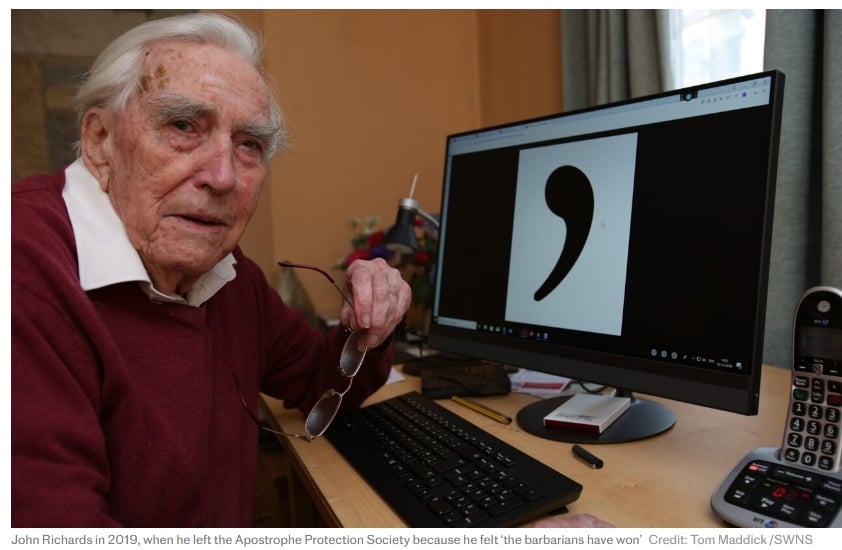
Why I Can’t Read the Newspapers Anymore
(New English Review) – Who can forget where he or she was when news struck of the decision by retired English journalist John Richards to close the Apostrophe Protection Society? Who wasn’t rocked when Richards, 95, announced in 2019 that he and his society, which had grown in 18 years to several hundred stalwarts, were giving up?
“The barbarians have won,” he conceded. This surrender shocked as much as if news came that the Berlin Wall had been rebuilt or Taylor Swift entered a nunnery.
In an example of the barbarians’ grubby victory, The Wall Street Journal noted in its 2021 Richards’ obituary, the apostrophe champion once pointed out to a restaurant manager that advertising “coffee’s” was mistaken. The man wanted not a singular possessive but a simple plural. Unmoved, the heathen replied, “I think it looks better with an apostrophe.”
If civilization’s battlelines cannot hold at the apostrophe, then let defenders retrench and repel the onslaught of superfluous adverbs, adjectives, prepositions, pompous phrases and mindless descriptors—which any intelligent person knows are merely adjectives.
For example (taken from issues of the print Wall Street Journal, which despite its flaws remains the only generally readable large-circulation American daily newspaper):
“Cities are still being overrun with illegal migrants who force officials to divert resources away [emphases added in all cases] from communities that were already struggling,” the Journal’s otherwise estimable columnist Jason L. Riley writes. No. “Divert” means move something away from something else. “Away” after “divert” is irritatingly duplicative.
An editorial during the Biden administration asserted that “the communique from Treasury Secretary Janet Yellen and other G-7 finance ministers carefully skirts around the main targets of their proposal.” No. “Skirts” here plainly means avoid or evade. “Around” in this case is as necessary as a hoop under yoga pants.
Likewise, the nearly inescapable “advocate for.” Reprinting an item from another publication, the Journal wrote, “A tough-on-crime candidate could run a no-nonsense campaign advocating for victims and safer streets, of course.” No, no, a thousand times no!
Did the writer and copy editors fail high school Latin I? Ad-voc-ate. To speak for. The “for” is already there, like “away” in divert and “around” in skirts.
“Amazon.com Inc. capped off its pandemic-fueled 2020 financial performance” … Gymnast Simone Biles capped off an epic comeback in Paris …”
To reiterate, or rather, insist: No. Amazon capped its pandemic-fueled performance. Biles capped an epic comeback. The unneeded “off” weakens the power of “capped” alone.
No one says “boot up” anymore when he or she (not “they”) starts his or her (not their) computer. So please, spare us all those “freed up” funds, resources and personnel. And the execrable ramp up mind virus. Increase or boost does nicely, thank you.
Free instead cranial space for grammar, syntax and diction. If those topics recall unpleasant memories of ninth grade English, then put it as Miss Swift or Mrs. Betty Theobald—my own teacher of that subject—might have: free space for the verbal music of beautiful language.
Spoken and hence written tone-deafness overwhelms. “[Vice President] Vance said Russia doesn’t view a 30-day cease-fire as in their strategic interests.” Any sixth-grader reading at grade level, let alone a Yale University law school graduate and best-selling author like our number two, ought to recognize Russia as singular and their as plural. Plural collective nouns in such cases, for example “Parliament they,” are British; singular collective nouns like “Congress it,” are American.
Unless you sell automobiles. Then it’s “See the cars at Terry’s Toyotas—they’ve got the biggest selection in town.” Who has the biggest selection, the cars? No, they don’t. Terry does.
Not only The Wall Street Journal can’t hear itself write. The Washington Post, which chronically misuses execute when the news tells of murder—the former is a legitimate response by a lawful state to conviction for a capital crime, which murder is—once headlined “NASA: Earth trapping ‘unprecedented’ amount of heat.” Our planet, the newspaper said, failed in sufficiently radiating back out or reflect[ing] solar energy back into space.
Nope. Radiate means emit, reflect to turn away. Misbegotten adverbs and prepositions—don’t forget “balance out,” “fill up” and “allow for”—stalk today’s journalism like zombies on Halloween.
We also read of “unproven allegations,” strategists changing their “calculus” (calculations, anyone?), everyone from waiters to politicians “offering up” when they simply offer, combat that “flared up” when it just flared and the ever-expanding verbal blob, first-ever. Tellingly, we rarely encounter fourth-ever. Now hear this: first means first. It’s unique that way. Not very unique.
As for analytics and metrics, bloviating versions of analyses and measurements, may they fade (not fade away) like telephony from the early days of cell phone commercials.






